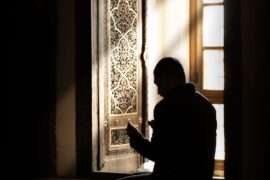You can read part 3 of this series by clicking the link: http://lubnah.me.ke/the-greatness-of-prophet-muhammad-p-b-u-h-pt-3/
HIS WORSHIP
If we knew for sure that we will go to jannah, if we knew for sure that all our sins are forgiven, that Allah (S.W.) is pleased with us and that our place in heaven is ready for us, would we bother to worship Allah? Would we still strive to be better worshippers, better believers? Or would we just relax and wait for our time of death to come?
The prophet (p.b.u.h) was granted forgiveness and promised jannah while still alive, yet he did a lot of ibaadah and got close to Allah (S.W.) more than any other human being.
Even before prophethood, Muhammad (p.b.u.h) would seclude himself so as to worship one Lord and avoid idolatry as his people.
According to Al Bukhari and I quote: “The commencement of the divine inspiration to the Messenger of Allah was in the form of good dreams which came true like bright day light, and then the love of seclusion was bestowed on him. He used to go in seclusion in the Cave of Hira’ where he used to worship [Allah alone] continuously for many days before he would desire to see his family. He used to take with him the journey food for the stay and then come back to [his wife] Khadija to take food for another stay, until suddenly the Truth descended upon him while he was in the Cave of Hira’. The angel came to him and asked him to read. The Prophet replied, “I do not know how to read.” The Prophet added, “The angel caught me [forcefully] and pressed me so hard that I could not bear it any more. He then released me and again asked me to read and I replied, ‘I do not know how to read.’ So he caught me again and pressed me a second time till I could not bear it any more. He then released me and again asked me to read but again I replied, ‘I do not know how to read.’ So he caught me for the third time and pressed me, and then released me and said:
Read in the name of your Lord who created (96.1). He created man from a clot (96.2). Read and your Lord is most honorable (96.3) who teaches by the pen (96.4). He taught man what he did not know (96.5).”
The worshipping habits of the Rasul (S.A.W) is definitely something we should emulate and follow. Here are some of his worship habits:
- Al-Mughirah ibn Shu’bah reported: The Prophet, peace and blessings be upon him, would pray until his feet were swollen. It was said, “Why do you do this when Allah has forgiven your past and future sins?” The Prophet said, “Shall I not be a grateful servant?” (Muslim)
- Narrated ‘Alqama: I asked `Aisha, mother of the believers, “O mother of the believers! How were the deeds of the Prophet? Did he use to do extra deeds of worship on special days?” She said, “No, but his deeds were regular and constant, and who among you is able to do what the Prophet (ﷺ) was able to do (i.e. in worshipping Allah)?” (Bukhari)
- Narrated ‘Aisha: Allah’s Apostle used to offer eleven Rakat and that was his prayer. He used to prolong the prostration to such an extent that one could recite fifty verses (of the Quran) before he would lift his head. He used to pray two Rakat (Sunna) before the Fajr prayer and then used to lie down on his right side till the call-maker came and informed him about the prayer. (Bukhari)
- Narrated Aisha: With the start of the last ten days of Ramadan, the Prophet (ﷺ) used to tighten his waist belt (i.e. work hard) and used to pray all the night, and used to keep his family awake for the prayers. (Bukhari)
- It was narrated that ‘Aishah said: “The Prophet used to bring his head close to me when I was menstruaring and he was in I’tikaf (seclusion in a mosques for the purpose of worship), and I would wash it and comb his hair.” (Sunan Ibn Majah)
- Narrated Anas bin Malik: Sometimes Allah’s Apostle would not fast (for so many days) that we thought that he would not fast that month and he sometimes used to fast (for so many days) that we thought he would not leave fasting through-out that month and (as regards his prayer and sleep at night), if you wanted to see him praying at night, you could see him praying and if you wanted to see him sleeping, you could see him sleeping.(Bukhari)
- Narrated ‘Aisha: The Prophet was never more regular and particular in offering any Nawafil than the two Rakat (Sunna) of the Fajr prayer. (Bukhari)
- It was narrated that ‘Aishah said the Messenger of Allah would come and say: “Do you have any food for breakfast?” and we would say no, so he would say: “I am fasting.” One day he came to us and we had been given some Hais. He said: “Do you have anything (to eat)?” and we said: “Yes, we have been given some Hais.” He said: “I started the day wanting to fast,” but then he ate. (Sunan an-Nasa’i)
- Narrated by Abu Huraira:”The Prophet used to perform Itikaf every year in the month of Ramadan for ten days, and when it was the year of his death, he stayed in Itikaf for twenty days.”(Bukhari)
- Aisha mentions that: “The Prophet one night stood up for Salah and he stayed in it for so long that I thought the Prophet had passed away or died. When I felt that way I stood up shook his toe and I felt the movement then I laid down again and I heard the Prophet saying in Sajdah “I seek refuge in Your pleasure from Your wrath, and in Your pardon from Your punishment, and in You from You. I cannot enumerate Your praises as You praise Yourself.” (Transliteration: Audhu bi ridaka min sakhatika, wa bi muafatika min uqubatika wa bika minka, la uhsiy thana’an alayka, anta kama athnayta ala nafsika).
When he stood up from the Sajdah he asked Aisha, “do you think God’s Prophet has betrayed you?” Aisha responded “No Prophet of God, because of the long Sajdah I thought you had died.” (Hadith from Baihaqi)
PROPHET’S DA’AWAH CONSISTED OF:
- Calling to the religion of Islam
- Calling to tawheed (Oneness of Allah) and Imaan in Allah (S.W.)
- Standing firm to the word of God
- Enjoining good and forbidding evil
- Showing exemplary manners and good behaviour.
STYLES OF DOING DA’AWAH
- Individual approaches:
The prophet peace be upon him would talk, discuss and call individuals to Islam at the market, on the way, and at any opportunity he got. It is said that he went to visit Abu Jahl 70 times to call him to the true religion.
- Group Da’wah
The prophet peace be upon him would sometimes bring together several people at Jabal Abi Qays and inform them of the word of Allah (S.W)
- Making promises:
Promises give us hope of what’s to come and make us anticipate the future and all it holds. The prophet peace be upon him having being known as the honest and truthful one, no one used to doubt his words. Therefore, Muhammad peace be upon him would give glad tidings to encourage people to embrace Islam or to increase their imaan.
“During the Hijra (migration from Makkah to Madina), the Prophet (pbuh) met Abu Bakr at his house, and they both traveled to a nearby cave, the Jabal Thur. When the quraysh realized that the Prophet had evaded them, they were furious. They looked for him everywhere and on all roads; they also offered a reward of 100 she-camels for anybody who would bring them the Prophet, dead or alive.
Motivated by the large reward, one of the best trackers in Mecca, Suraqa Ibn Malik, went riding on his horse looking for the Prophet (pbuh) every which way until he found him. Dressed in his armor and sword, Suraqa attempted to kill the Prophet but as soon as he would approach him, his horse would sink into the sand and not budge. He tried several times and when he realized it was a miracle, he said: “Oh Muhammad I know that your religion will spread and that your stance shall rise. Promise me that when you have the upper hand and are in power you will treat me well. I would like you to give me this promise in writing.”
The Prophet ordered Abu Bakr to give him the promise in writing and asked Suraqa to mislead the enemy away from the Prophets hiding place. The Prophet (pbuh) also said: “How would you feel, O Suraqa, when you wear the bracelets of Kisra (the King of Persia at the time Persia)?” There was only one Kisra and everyone knew who this was, but this statement was so shocking that Suraqa ibn Malik had to clarify again: “Kisra!?” The Prophet (saws) said “Yes, Kisra the son of Hermuz.”
These Bracelets were very famous, the equivalent to the Crown Jewels in our days. They were worn by the Persian Kings, who would simply rest their hands in them as a show of power. For a man who was fleeing persecution and on the brink of assassination, this promise seemed hardly possible. Thereafter; Suraqa retreated, and the Prophet proceeded towards Madinah. This was Hijrah, the emigration – a small distance in space, a mighty leap in history, an event that was to become a threshold in the shaping of the Islamic Ummah.
Several years later, Suraqa converted to the religion of Islam and came to Medinah where the Prophet resided. Years passed, and life went on. It was during the Caliphite of ‘Umar Ibn Al Khattab, Suraqa joined the army which later prevailed over the Persians in the battle of Qadisiyya and the booty was brought to Medinah. Among them, was the crown of Kisra, his clothes sewn out of gold thread, his scarf adorned with precious jewels, and his bracelets like which nobody had ever seen before. ‘Umar shouted: “Where is Suraqa Ibn Malik?” So he came and wore the bracelets of Kisra. He walked around with them proudly, tears flooding from his eyes, saying: “Behold, the honest and the trustworthy Muhammad (pbuh) has told the truth after 20 years. He has kept his promise.” ‘Umar then raised his head to the heavens above and said: “Oh Allah, You did not reward this wealth to your Prophet, and he was closer to You and loved by You more than I, neither did You reward this wealth to Abu Bakr and he was closer to You and loved by You more than I, and You gave it to me. I seek refuge from You in what You have given me and hope that this is not a test from You in which I fail.” [imedbham.webs.com. Reference used: “100 Stories from the Life of ‘Umar Ibn Al Khattab” by Muhammad Sedeeq Al Minshawi]
- Having discussions and debates
The prophet used to have stimulating conversations, discussions and debates as a way of teaching and imparting knowledge to both muslims and non-muslims. The prophet (s.a.w) once had a conversation with one of the non-muslims. The prophet asked him how many gods he believed in and the qureishi answered that he believed in six gods. The prophet asked him where the gods were and the qureishi answered that five of the gods were in earth and one is in the heavens. The prophet asked the qureishi which god he depended on most when he had difficulties and the qureishi answered that he depended on the one that is in the heavens. The prophet of Allah thus told him that he should then only worship the God that is in the heavens and leave the rest. This was a way of awakening the qureishi and a way of imparting knowledge such that a person could come to self-realization.
- Showing kindness
Kindness is the language that all humankind understands and appreciates. What better way to show how beautiful our religion Islam is than to be kind to the people? Muhammad peace be upon him was the most kind human being and naturally, people were drawn to him for that.
Anas bin Malik, radi Allahu ‘anhu, narrated, “The Messenger of Allah was never asked for a thing by one who may be about to accept Islam, except that he would give it. A man came to the Prophet, who gave him a herd of sheep filling an area between two mountains. When that man returned to his people, he said to them: ‘O my people! Embrace Islam. Muhammad gives, like one who has no fear of poverty.’”
Anas, radi Allahu ‘anhu, said the person initially embraced Islam for the sake of the world, but later Islam became dearer to him than the world and what it contains. (Muslim)
P.S I am not a scholar and this is my little effort in spreading the knowledge therefore in case of any mistake/correction/addition needed in this article about the prophet (p.b.u.h) and his life, kindly email me at: info@lubnah.me.ke.
***
Assalam aleykum,
I hope you are in good health and state of Imaan. A lady by the name of Nuru Salim is suffering from endometriosis which makes it extremely painful for her. She desperately needs an operation in India of which needs about 500,000/= kenyan shillings. We are currently at 41,946/= and still very far away from the target…but wallahy we can do this. If we all share the message as much as possible and give whatever we can then we can achieve this biidhnillah. Every coin goes a long way and every share of this message will be really helpful. May you be rewarded for any effort you put into this. Ameen.
To contribute Mpesa: 0700892829 (Said Salim)

![THE GREATNESS OF PROPHET MUHAMMAD (P.B.U.H) [PT. 4]](https://lubnah.me.ke/wp-content/uploads/2019/01/atlantic-3757677_960_720-770x515.jpg)


